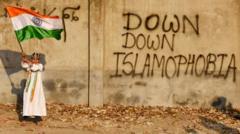The incident highlights rising religious tensions in India, exemplifying the challenges faced by minority communities as a Muslim couple is coerced into selling their newly bought home after protests from Hindu residents.
Hindu Neighbors Force Muslim Family to Abandon New Home Amid Protests

Hindu Neighbors Force Muslim Family to Abandon New Home Amid Protests
A Muslim couple faces intimidation and condemnation from Hindu neighbors in Moradabad, India, leading to the forced sale of their home.
A Muslim couple in the affluent TDI City of Moradabad, India, has been compelled to sell their newly-acquired house following aggressive protests from neighboring Hindu residents. The unrest took root when it became known that Dr. Ashok Bajaj, a long-time resident of the community, had sold his property to the couple, which led to chants and slogans calling for the transaction to be nullified.
One protestor, Megha Arora, vocalized the sentiments of many in the area, expressing that a Muslim family living in proximity to the local temple was unacceptable. “We must protect our community and our women’s safety,” she asserted, demanding the administration rescind the couple's ownership. Various residents escalated their objections by visiting government offices to file formal complaints against both Dr. Bajaj and the new owners.
Dr. Bajaj, who runs a local eye hospital and had resided in the society for over six years, later disclosed that he had reached a mediated agreement to reverse the home sale after considerable community backlash. The Muslim couple, both medical professionals, decided it was best to sell the house to a Hindu family already residing in the colony due to the overwhelming hostility they faced. Dr Bajaj described the protests as unforeseen and unwarranted, particularly upsetting the balance of the neighborhood he believed had embraced diversity.
The incident has elicited national outrage, with many voices on social media condemning the discrimination faced by the Muslim couple. Tanvir Aeijaz, a professor of politics and public policy, noted that this event illustrates the deepening religious polarization occurring in society. Segregation based on faith and ethnicity has been a persistent issue across India, where housing discrimination often appears in the form of community guidelines favoring Hindu customs, diminishing the rights of Muslim families.
Such occurrences are not new to Moradabad; in the past, there have been similar instances where communal tensions escalated when Muslim families attempted to settle in Hindu-majority areas. Aeijaz emphasized that current events reflect not just a societal issue, but a constitutional crisis, suggesting that continued discrimination against Muslims undermines the basic tenets of equality enshrined in Indian law.
Social media commentary on the case indicates a widespread perception of failing communal harmony, with critiques aimed at the protests as a sign of growing intolerance. Nevertheless, some experts maintain a glimmer of hope, citing the pluralistic roots of Hinduism, suggesting that many Hindus oppose such acts of hate and division.
This disturbing event underscores the ongoing struggle for religious minorities in India and raises critical questions about the state of secularism and communal coexistence in the nation today.




















